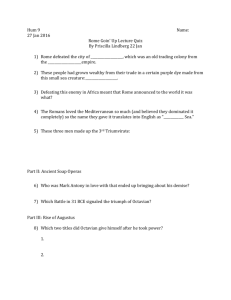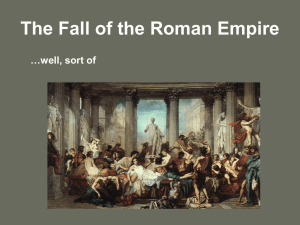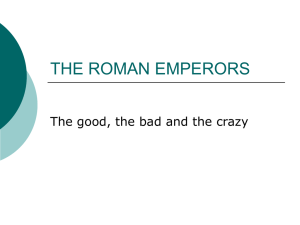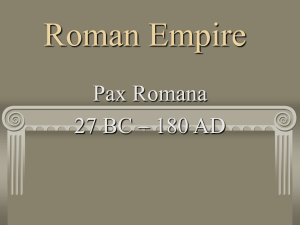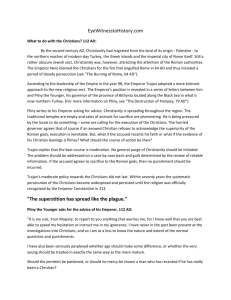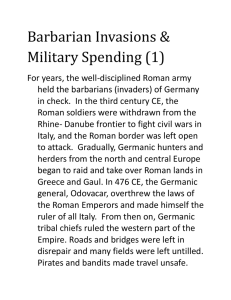Roman religion
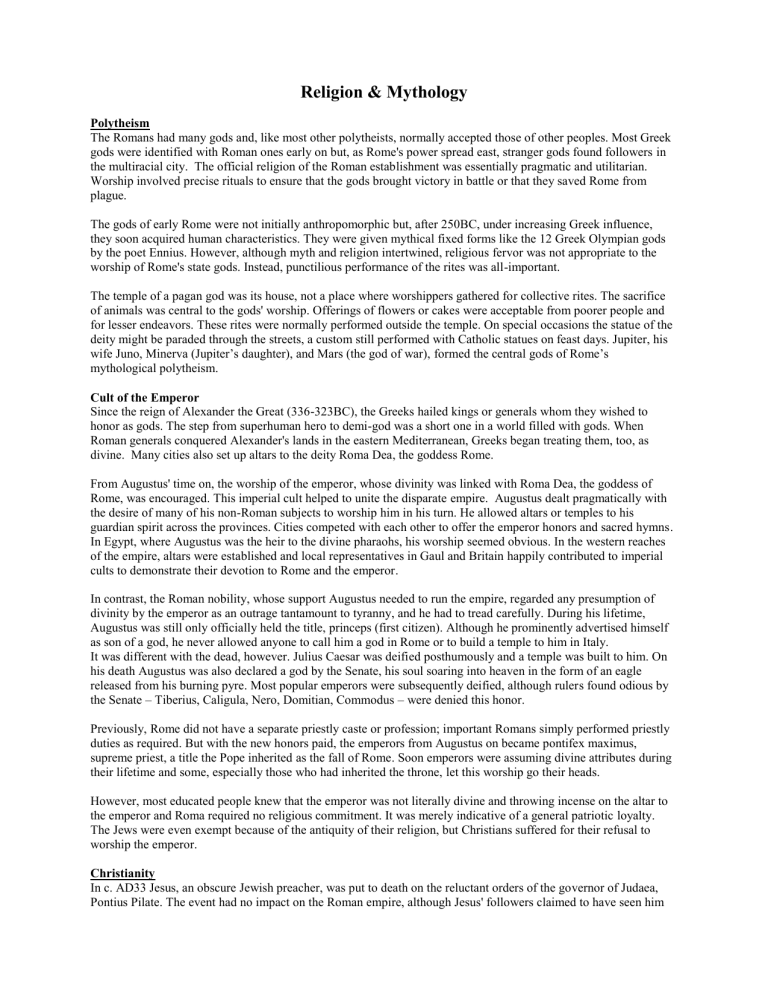
Religion & Mythology
Polytheism
The Romans had many gods and, like most other polytheists, normally accepted those of other peoples. Most Greek gods were identified with Roman ones early on but, as Rome's power spread east, stranger gods found followers in the multiracial city. The official religion of the Roman establishment was essentially pragmatic and utilitarian.
Worship involved precise rituals to ensure that the gods brought victory in battle or that they saved Rome from plague.
The gods of early Rome were not initially anthropomorphic but, after 250BC, under increasing Greek influence, they soon acquired human characteristics. They were given mythical fixed forms like the 12 Greek Olympian gods by the poet Ennius. However, although myth and religion intertwined, religious fervor was not appropriate to the worship of Rome's state gods. Instead, punctilious performance of the rites was all-important.
The temple of a pagan god was its house, not a place where worshippers gathered for collective rites. The sacrifice of animals was central to the gods' worship. Offerings of flowers or cakes were acceptable from poorer people and for lesser endeavors. These rites were normally performed outside the temple. On special occasions the statue of the deity might be paraded through the streets, a custom still performed with Catholic statues on feast days. Jupiter, his wife Juno, Minerva (Jupiter’s daughter), and Mars (the god of war), formed the central gods of Rome’s mythological polytheism.
Cult of the Emperor
Since the reign of Alexander the Great (336-323BC), the Greeks hailed kings or generals whom they wished to honor as gods. The step from superhuman hero to demi-god was a short one in a world filled with gods. When
Roman generals conquered Alexander's lands in the eastern Mediterranean, Greeks began treating them, too, as divine. Many cities also set up altars to the deity Roma Dea, the goddess Rome.
From Augustus' time on, the worship of the emperor, whose divinity was linked with Roma Dea, the goddess of
Rome, was encouraged. This imperial cult helped to unite the disparate empire. Augustus dealt pragmatically with the desire of many of his non-Roman subjects to worship him in his turn. He allowed altars or temples to his guardian spirit across the provinces. Cities competed with each other to offer the emperor honors and sacred hymns.
In Egypt, where Augustus was the heir to the divine pharaohs, his worship seemed obvious. In the western reaches of the empire, altars were established and local representatives in Gaul and Britain happily contributed to imperial cults to demonstrate their devotion to Rome and the emperor.
In contrast, the Roman nobility, whose support Augustus needed to run the empire, regarded any presumption of divinity by the emperor as an outrage tantamount to tyranny, and he had to tread carefully. During his lifetime,
Augustus was still only officially held the title, princeps (first citizen). Although he prominently advertised himself as son of a god, he never allowed anyone to call him a god in Rome or to build a temple to him in Italy.
It was different with the dead, however. Julius Caesar was deified posthumously and a temple was built to him. On his death Augustus was also declared a god by the Senate, his soul soaring into heaven in the form of an eagle released from his burning pyre. Most popular emperors were subsequently deified, although rulers found odious by the Senate – Tiberius, Caligula, Nero, Domitian, Commodus – were denied this honor.
Previously, Rome did not have a separate priestly caste or profession; important Romans simply performed priestly duties as required. But with the new honors paid, the emperors from Augustus on became pontifex maximus, supreme priest, a title the Pope inherited as the fall of Rome. Soon emperors were assuming divine attributes during their lifetime and some, especially those who had inherited the throne, let this worship go their heads.
However, most educated people knew that the emperor was not literally divine and throwing incense on the altar to the emperor and Roma required no religious commitment. It was merely indicative of a general patriotic loyalty.
The Jews were even exempt because of the antiquity of their religion, but Christians suffered for their refusal to worship the emperor.
Christianity
In c. AD33 Jesus, an obscure Jewish preacher, was put to death on the reluctant orders of the governor of Judaea,
Pontius Pilate. The event had no impact on the Roman empire, although Jesus' followers claimed to have seen him
alive soon after and began preaching his resurrection, first to Jewish communities around the Mediterranean and then, under the forceful guidance of Paul of Tarsus, to the wider Greek and Latin-speaking world.
Initially considered a form of Judaism by the Romans, Christianity was recognized as a distinct sect in AD64 after the great fire of Rome, which the people blamed Nero for starting. The Christians made useful scapegoats for the emperor, who had some rounded up, coated with pitch and set alight. Even Roman audiences found this hard to stomach and such mass persecutions were long the exception. The Christians were not popular, however. What
Christians believed did not worry most pagans; it was what they openly refused to accept that caused problems, especially when the empire was in crisis. By refusing even to sacrifice incense to the goddess of Rome, Christians were offending the gods' united protection that the empire desperately needed. This led to imperially sponsored persecutions.
Although mobs seem to have enjoyed tormenting this helpless minority, Christianity continued to expand.
Christianity first appealed mainly to women and slaves (another reason for suspicion); however, letters between
Trajan and Pliny the Younger, c. AD110, show the emperor restraining would-be persecutors, insisting that
Christians be given fair trials and forbidding anonymous letters of accusation. Christianity also appealed to intellectuals and the Christian church's structure proved supportive in a way unmatched by any other cult.
Christianity's final triumph was due chiefly to its promotion by Constantine after AD312. But, as the Roman empire became Christian, Christianity in turn became imperially Roman. After a military victory, Constantine believed himself to be protected by the Christian god. When Constantine died in AD337, his successors continued his
Christianizing policies. With the disasters of the 5th century AD and the fall of Rome, most Romans in the West turned in despair to Christianity, whose kingdom was not of this world. However, in the East paganism survived in substantial pockets into the 6th century AD.
